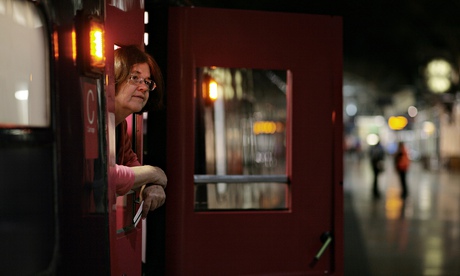End of the line for Europe's iconic night trains?The sleeper service is being phased out across the continent as operators are hit by hefty taxes and rise of budget airlines The Night Riviera, a sleeper train operated by First Great Western and one of only two sleeper services in the UK▸ ^ the other being the Caledonian Sleeper. Photograph: Martin Godwin for the Guardian
The Night Riviera, a sleeper train operated by First Great Western and one of only two sleeper services in the UK▸ ^ the other being the Caledonian Sleeper. Photograph: Martin Godwin for the GuardianTo their fans, night trains sum up the best of the European project. They are time efficient, environmentally sustainable, and irresistibly romantic: you go to sleep in one country and wake up in another, possibly having made friends along the way.
In public at least, Europe's politicians and railway companies agree: in December 2009, many of them ceremonially boarded a specially commissioned "Climate Express" from Brussels to the UN climate summit in Copenhagen.
Yet five years later, sleeper trains are being silently phased out across the continent, while countries elsewhere in the world are modernising their services.
Deutsche Bahn, the German rail provider, confirmed this month that its City Night Line sleeper trains on the Climate Express route would cease from 1 November, while the night train that connects Paris to Berlin, Hamburg and Munich will be stopped from December. The Amsterdam to Prague and Warsaw sleeper will be cut back to run from Cologne to Warsaw and Prague.
The Elipsos night train from Paris to Barcelona and Madrid ^ launched in 1969 with ground-breaking technology, allowing carriages to switch between multiple track gauges ^ was discontinued in December.
Thello, a joint venture between Trenitalia and France-based Transdev, in December scrapped its sleeper train between Rome and Paris, the continent's most romantic capitals. Passengers now have to make at least one change en route, usually at Turin or Milan. Services from Berlin to Warsaw and Kiev, as well as the weekly Sibirjak service to Siberia, have also been withdrawn recently.
"The
EU» is professing its investment in rail services," Mark Smith, who runs the award-winning Man on Seat 61 railway blog, told the Guardian. "But, in reality, it seems to be actually shifting traffic to the airways."
German rail services cite declining passenger numbers, caused by the rise of low-budget airlines, as the main reason for phasing out services. A spokesperson from Die Bahn said its night-train customers had fallen by 25% over the past five years, while its three least profitable sleeper lines had turned a loss of ^12m. Julio G^mez-Pomar, the president of Renfe, Spain's state-owned company which operates freight and passenger trains, has said that some of its night services had been cut because they were circulating with empty coaches.
A spokesperson for Trenitalia, which has in recent years reduced the number of domestic sleepers connecting the south of the country to the north, said: "In the last 10 years there has been a reduction in night-train services, both in terms of the public resources earmarked for their running and because of the gradual decrease in their use, which has suffered a big decline connected to the arrival of low-cost flights, competition from coaches and the launch of the high-speed network."
Sleeper trains are undoubtedly more expensive to run than day services. For a start, they hold fewer passengers: a typical sleeper carriage carries 36 people, as opposed to 70 on a seating-only train.
In addition, since 2000 train services have had to pay track access charges as they cross borders, with additional administration and negotiations required to work out precise costs.
In Germany, train companies further complain that they are burdened by eco taxes and
VAT▸ on ticket sales from which airline operators are exempt.
Yet campaigners, many of whom rely on sleeper services as they choose not to fly for environmental reasons or cannot do so on health grounds, claim that rail providers' complaints about declining passenger figures are a self-fulfilling prophecy.
Since train companies have for years failed to invest in more comfortable carriages, overnight train journeys have for many lost their appeal. When the Paris to Berlin sleeper was launched in 2000, it had a dining car and onboard chef. These days, passengers on the same route can only buy microwave meals to eat on their laps.
While plane tickets can be bought cheaply months in advance, night train schedules are often changed at short notice due to overnight engineering works. Loco2, a UK booking agency for pan-European rail journeys, said it had seen a lot of demand for night trains, but was allowed by Deutsche Bahn to sell tickets only for its day services.
"There's no basis to the argument that sleeper trains are outmoded per se," said blogger Jon Worth, who has launched a petition to save the Copenhagen night train. Britain has announced upgrades to its Caledonian and London-Penzance sleeper services, while China and Russia have invested in new night-train carriages, he pointed out.
"Railways are still the most environmentally sustainable and comfortable way of getting around Europe. You cannot expect people to spend a day on a train ^ you can expect them to spend a night."





